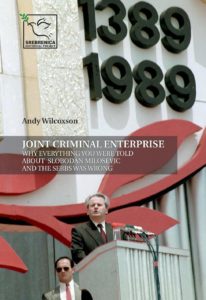A casual reader of this book would never suspect that its author is not a lawyer or historian but a person with a background in the technical sciences. With remarkable clarity and ample documentation, Andy Wilcoxson calls into question the major postulates of the “received wisdom” about conflicts in Yugoslavia in the 1990s and compellingly proposes an alternative and more factually consistent interpretation of the genesis, course, and consequences of those events.
Many years ago, a philologist friend of mine shared with me her somewhat controversial theories and findings. I noticed her almost systematic avoidance of what passes for contemporary scholarship and preference for scholars from the preceding century, many of whom did not necessarily hold teaching positions at major universities. Her response was that scholars unattached to the principal institutions of learning are less prone to external influences and generally do not have an incentive to compromise the truth for the sake of peer approval or perceived status. In her judgment, that made them more trustworthy. I was not fully convinced by her explanation when I first heard it, but I do see her point better now.
It is difficult to deny that the “father of history,” Herodotus, who also was not a professional, trained, and academic historian, did nevertheless set the standard although his Histories, as far as it is known, were never properly peer-reviewed in contemporary academic publications. Still, both substantively and methodologically his work has largely withstood the test of time and remains a viable model of historical inquiry. Time will show, but one suspects that, for a non-lawyer, Andy Wilcoxson’s audaciously titled Joint criminal enterprise will also eventually pass all relevant tests, and with flying colors.
This book, in essence, boldly challenges the predominant perception of the events it analyses. Bits and pieces of that narrative have already been challenged by others, but Wilcoxson throws the gauntlet to the whole bowl of wax. The subtitle, “Why everything you were told about Slobodan Milosevic and the Serbs was wrong”, clearly signals that his critique is deliberately intended to be across the board. Anyone, however, expecting to find an ethnically motivated apologist will be sorely disappointed and quickly proved wrong. The author is as American as apple pie, he has no Serbian or Balkan roots, and his motivation consequently is not tribal but purely ethical. As a high school student during the 1990s he witnessed the attribution of full-spectrum guilt for the horrors of the conflict in the Balkans exclusively to one of the contending sides. Initially that piqued his curiosity. But as he delved deeper, it was his sense of justice that eventually became outraged. That culminated with the NATO bombing of Yugoslavia in 1999, ostensibly out of compassion for Kosovo. The thought that constantly reverberated in his mind was “why are we heaping such abuse on a people who had never done us any harm?”
That is indeed a very good question. The harm that was inflicted was not just material (ruined buildings and installations can be rebuilt) but primarily moral. It tainted an entire nation with the stigmas of aggression and genocide. That was the cumulative impact of the fake news about the conflict in Yugoslavia that deluged the world at the time it was going on. It crystalized in a false pseudo-historical narrative concocted by corrupt PR agencies hired by the more media savvy actors in the conflict, working in concert with governments pursuing their own selfish geopolitical interests.
Andy Wilcoxson’s study meticulously and calmly deconstructs the principal contours of that mendacious narrative.
Stephen Karganovic,
Srebrenica Historical Project
- Srebrenica demilitarization agreement of April 18, 1993
- New book on ICTY and Srebrenica: The Hague Tribunal, Srebrenica, and the Miscarriage of Justice

